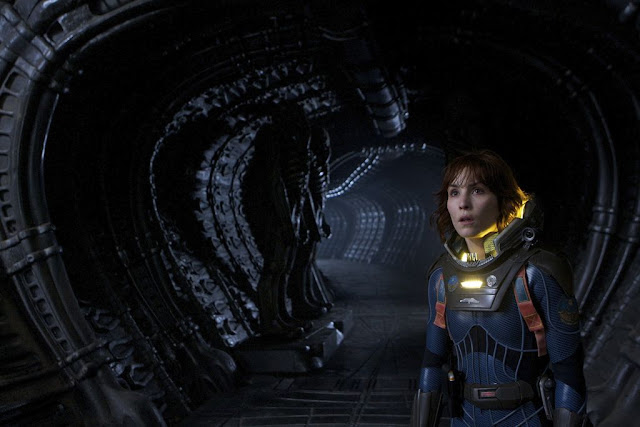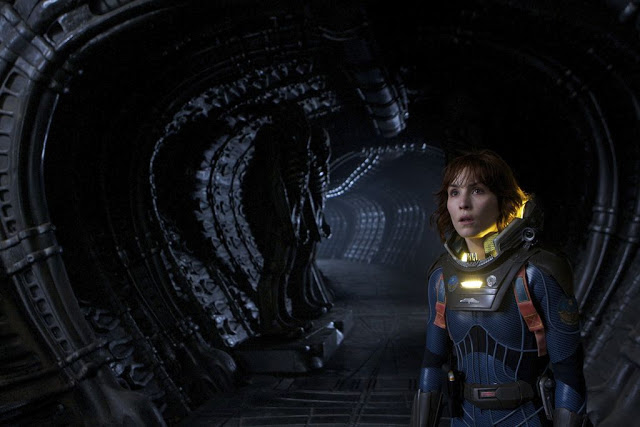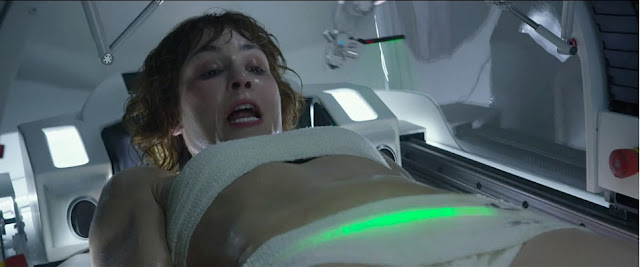 |
| Noomi Rapace as Dr. Elizabeth Shaw in Prometheus |
Guest post written by Rachel Redfern originally published at Not Another Wave. Cross-posted with permission.
The prequel and spinoff for the classic film Alien has as much feminist food as its precursor did, albeit slightly less groundbreaking, though we can’t fault it for that: Alien did give us the first female action hero in Sigourney Weaver’s portrayal of the irrepressible Ripley.
Prometheus is naturally larger in scale and far more reliant on special effects, a feature that while clichéd is expected in the current sci-fi action genre (not to be solely negative, the landscape was absolutely amazing and the cinematography superb, seriously, watch for some stunning views of Iceland’s Vatnajökull National Park, Hekla Volcano, and Detifoss Waterfall).
And while some of the scenes are admittedly, far more graphic and gratuitous than I think necessary (there is a simple purity to the original Alien death scenes that I think is lacking here), the film featured some thought provoking and disturbing themes, though all backed again by a strong, smart, female scientist-turned-reluctant heroine and survivor, similar to the original Ripley.
The Swedish Noomi Rapace (seriously loving these Swedish actors) and South African Charlize Theron oppose each other brilliantly; Theron as the efficient and disdainful corporate heavy, Noomi as the resistant, believing, courageous scientist out to find some answers.
The film features a hefty score of themes for discussion, including one of the most disturbing abortion scenes I’ve ever seen. That scene is apparently what pushed the film up from a PG-13 rating into an R; if the studio had wanted to ensure a PG-13 rating, the MPAA demanded that they cut the entire scene. However, both director Ridley Scott and Rapace felt the scene was pivotal in Shaw’s intense desire to survive and in her emotional and mental development. If you weren’t pro-choice before, chances are you might be after witnessing this scene.
Perhaps notable as well is the fact that Shaw (the character who has the abortion) must physically fight to have one, forcing her to face the ordeal entirely alone. After the operation we see a general disdain for her decision (though perhaps a grudging respect for her will to survive). What stunned me about the whole situation was the entire lack of care and concern she received after it happened, the whole horrific event was entirely passed over without even a raised eyebrow in her direction as to her well being. She is even brutally hit in the abdomen by an unfeeling thug, an action I felt very deliberate in its exploitation of her recent scarring experience.
In a recent interview, Rapace discussed the scene, stating that the four of days of shooting were the most stressful of the entire film and that she started to have vicious nightmares of alien babies growing inside of her. On a personal note, I can well imagine such nightmares: the fear of losing control, of something taking you over without your will, of something using your body as it’s own instrument, it’s a powerful message about the state of the female body in our society and I found it profound and disconcerting.
Sexual imagery as well abounds in the film and, as has been said of the other Alien films, there is a substantial amount of phallic imagery and perhaps (we don’t want to project too much here) the male fear of rape as many men are violently violated and penetrated by a long, tubular, animal, which of course impregnates them.
An interesting theme that is present in this film, but not the other Alien films is a profoundly religious one, the death of our makers. On Prometheus the death of a parent is the agent of destruction as each main character deals with the abandonment and rejection they feel from their creation and of course, their ensuring resentment towards that creator. Even the mission of the ship is designed to find our own creators and discover why they have abandoned us and why we were created in the first place, if we were just to be left to our own devices. The title of the film then becomes remarkably fitting (as I’m sure was intentional) since Prometheus was a Greek who stole fire from the Gods to give to humans, an act that lead to the humans advancement and eventual independence from their creators. Prometheus was brutally punished for his disobedience and his compassion, destined to suffer for eternity, however that doesn’t stop the continued progression of humanity.
Similarly in the film, the ship and its inhabitants are obviously being punished for their own disobedience and for the overwhelming intention to survive and protect themselves from their own creator’s rejection and malevolence.
Even Michael Fassbender, who plays a Lawrence of Arabia fan and a Peter O’Toole lookalike, states, “We all want our parents dead,” indicating that even he, as a robot is unsatisfied with his creator’s image. In an odd twitch the themes of creation and destruction then becomes mutually inclusive and creation becomes more of an act of ability rather than an act of love. Why do we make something? “Because we could.”
Although disturbing, I found the religious and social themes to be thought provoking and feminist-friendly and I would easily recommend the film. Though I did cover my eyes like a small child during a few of the more intense jump scenes.
Rachel Redfern has an MA in English literature, where she conducted research on modern American literature and film and it’s intersection, however she spends most of her time watching HBO shows, traveling, and blogging and reading about feminism.



1) the REMOVAL OF AN ALIEN SQUID as a pro-choice argument?
2) is the art of H.R. Giger ‘feminist’ in any way?